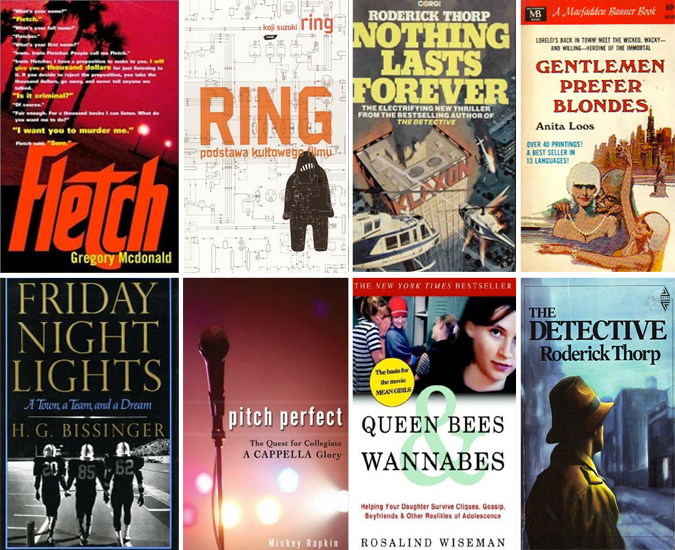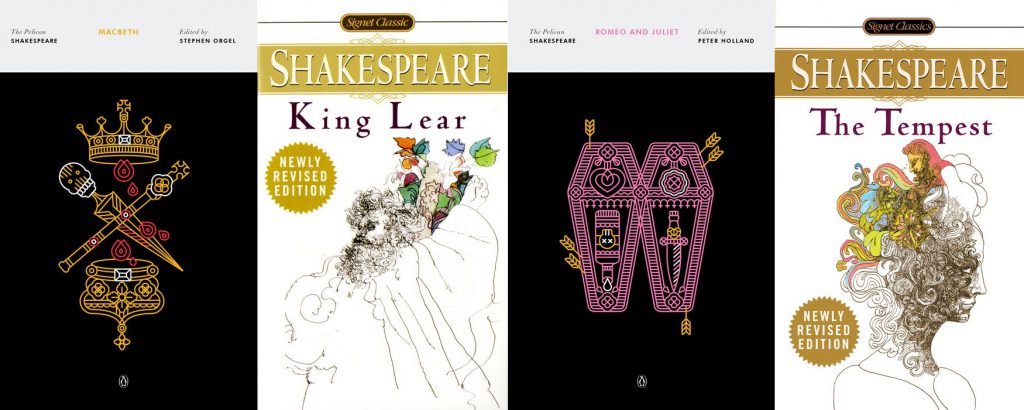That Was A Book?: 11 Movies You Probably Didn’t Know Were Adaptations
Books have long served as inspiration for filmmaking. Nowadays, as some publications become blockbusters, many cinematic adaptations come with built-in audiences of readers eager to see the beloved source material brought to life on the screen. But for every Gone Girl or Wild, there are films like the upcoming Mordecai, which you probably didn’t know is also an adaptation (in this case, of an anthology: The Mordecai Trilogy by Kyril Bonfiglioli).
Here are eleven more examples of movies you may not know started out as books:
Gentlemen Prefer Blondes: When you think of this musical from Hollywood’s Golden Age, you probably think of Marilyn Monroe singing “Diamonds Are a Girl’s Best Friend” in a hot pink gown, surrounded by tuxedoed gentleman. Long before this iconic moment of cinema, Gentleman Prefer Blondes began as a magazine series for Harper’s Bazar, written by Anita Loos. In 1925, it was published as a book and Edith Wharton declared it “The Great American Novel.” Following that was its first film adaptation in1928 (which is now lost), then a Broadway musical starring Carol Channing, then the 1953 classic film best known today.
Weird Science: Few filmmakers captured the plight of the American teenager the way John Hughes did; he conveyed the joys and anguish of high school though an honest, comedic—sometimes even absurd—lens. I mean, this movie is about two unpopular nerds who create a woman out of a Barbie doll and some wacky computer code. While Hughes wrote the script, did you know it was actually based on a comic book? It was adapted from Al Feldstien’s story 'Made of the Future,' part of a 1951 issue of the classic anthology called—you guessed it—Weird Science. Of course Hughes modified the story to his present day, so there was plenty more big hair and shoulder pads—it was the ‘80s, after all.
Mean Girls: Beloved by many, this 2004 comedy has developed a cult status in the last decade and left its mark on pop culture, with even the White House once tweeting a quote from the movie (“Bo, stop trying to make fetch happen.”). Tina Fey’s fresh and funny script was much lauded, but it was based on unexpected source material: Rosalind Wiseman’s Queen Bees & Wannabes, a parenting book providing guidance on how to help daughters navigate the treacherous social waters of adolescence. Who knew?
The Birds: Many (dozens!) of Alfred Hitchcock’s films were based on novels, but his work has become so iconic, it can be easy to forget the stories’ origins. This tale if avian terror is one such case and its author may come as a surprise. Daphne Du Maurier wrote the novella on which the film was based. Known more widely for her exceptional dark romantic novel Rebecca (which ol’ Hitch adapted so well in 1940, it won a Best Picture Oscar), The Birds was originally published in a 1952 issue of “Good Housekeeping.”
Crouching Tiger, Hidden Dragon: When Ang Lee’s martial arts marvel comes to mind, you probably think of the dazzling stunts and wire work that had the characters appear to be running up walls and flying through the air. But the film is actually based on five Chinese novels by Wang Dulu, called the Crane-Iron series, which chronicles four generations of youcxia (wandering knights). The movie shares the title of the fourth book in the series.
Fast Times at Ridgemont High: Amy Heckerling’s notorious teen sex comedy is memorable for many reasons, Sean Penn as stoner surfer Jeff Spicolli and a certain scene involving Phoebe Cates in a red bikini being just two. But did you know it was based on a non-fiction book? Penned by Cameron Crowe, this guy spent a year undercover as a high school senior (!) to collect stories for a collection that was published in 1981. A year later, Crowe adapted his own work for the screen, then went on to write and direct beloved films like Say Anything and Almost Famous.
Pitch Perfect: You’ve heard the songs and you can’t forget Rebel Wilson’s hilarious scene-stealing, but are you familiar with the book? Mickey Rapkin spent a season following three collegiate a capella groups for his non-fiction account of the traditions, rivalries, and even groupies that are part of this musical subculture. The resulting publication, Pitch Perfect: The Quest for Collegiate A Capella Glory, was the foundation for the lively musical comedy.
Die Hard: This film made Bruce Willis a bona fide movie star and went on to be a descriptor for many action movies that followed (Speed = “Die Hard on a bus”, Passenger 57 = “Die Hard on a plane”, you get the idea). It’s based on Nothing Lasts Forever by Roderick Thorp, the sequel to his novel The Detective which was adapted as a 1968 film starring Frank Sinatra. This follow-up adaptation was also offered to Sinatra, who turned it town, as did Arnold Schwarzenegger. But then Bruce Willis came along, the film was a smash and became a genre blueprint, and “yipeee-ki-yay [expletive optional]” was added to our pop culture lexicon.
The Ring: You’re probably aware that 2002 horror film starring Naomi Watts was based on the 1998 Japanese film of the same name. But did you know both are based on a novel? Published in 1991, The Ring by Kôji Suzuki was considered moderately successful and the story was adapted numerous times. In Japan, it served as the basis for a 1995 TV movie, a 1998 film, and a television series. The film itself inspired two remakes, one South Korean and one American. The one Stateside did gangbusters and paved the way for the slew of American remakes of Japanese horror films.
Friday Night Lights: Maybe you’ve seen the 2004 film starring Billy Bob Thornton or maybe you’re a fan of the excellent TV show of the same name (if your motto is “Clear Eyes, Full Hearts, Can’t Lose,” come sit by me). Both are based on Friday Night Lights: A Town, a Team, and a Dream, a 1990 non-fiction book written by H. G. Bissinger, who spent an entire football season in a small Texas town to chronicle its obsession with the sport. Fun fact: before the critically-acclaimed film and television adaptations, the book inspired a short-lived 1993 TV series starring a then-unknown Ben Affleck.
Fletch: Chevy Chase brought the Irwin “Fletch” Fletcher to life so vividly in the 1985 comedy classic, it may be surprising to learn that the irreverent detective originated in the pages of a mystery novel. Written by Gregory Mcdonald, darker in tone, and heavily dialogue-driven, the popularity of the first Fletch book spawned an entire series. The film adaptation also proved successful, but only resulted in a single 1989 sequel, Fletch Lives, while a prequel, Fletch Won, has been in talks for over twenty years.

Margarita Montimore
Margarita writes upmarket fiction and is represented by Victoria Skurnick at Levine Greenberg Rostan. She also transcribes and pokes fun at her old journal entries at The Diary Project. When not wrangling her ever-growing book and movie collections or feeding squirrels and chipmunks, she dreams of the day time machines are built so that she can return to the 1980s. Follow her on Twitter at @damiella.



